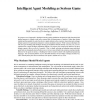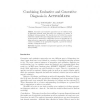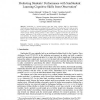64 search results - page 5 / 13 » Modeling self-efficacy in intelligent tutoring systems: An i... |
109
click to vote
ITS
1998
Springer
15 years 6 months ago
1998
Springer
This paper describes a method for learner modelling for use within simulation-based learning environments. The goal of the learner modelling system is to provide the learner with a...
132
click to vote
AGS
2009
Springer
15 years 8 months ago
2009
Springer
We propose a novel approach to intelligent tutoring gaming simulations designed for both educational and inquiry purposes in complex multi-actor systems such as infrastructures or...
100
click to vote
AIED
2009
Springer
15 years 8 months ago
2009
Springer
Generative and evaluative approaches are two different ways of diagnosing students’ input that have been realized in a number of intelligent tutoring systems. We describe how Ac...
106
click to vote
AIED
2007
Springer
15 years 8 months ago
2007
Springer
SimStudent is a machine-learning agent that learns cognitive skills by demonstration. SimStudent was originally built as a building block for Cognitive Tutor Authoring Tools to hel...
114
click to vote
AGENTS
2000
Springer
15 years 6 months ago
2000
Springer
This paper presents a knowledge approach to designing team training systems using intelligent agents. We envision a computer-based training system in which teams are trained by pu...



